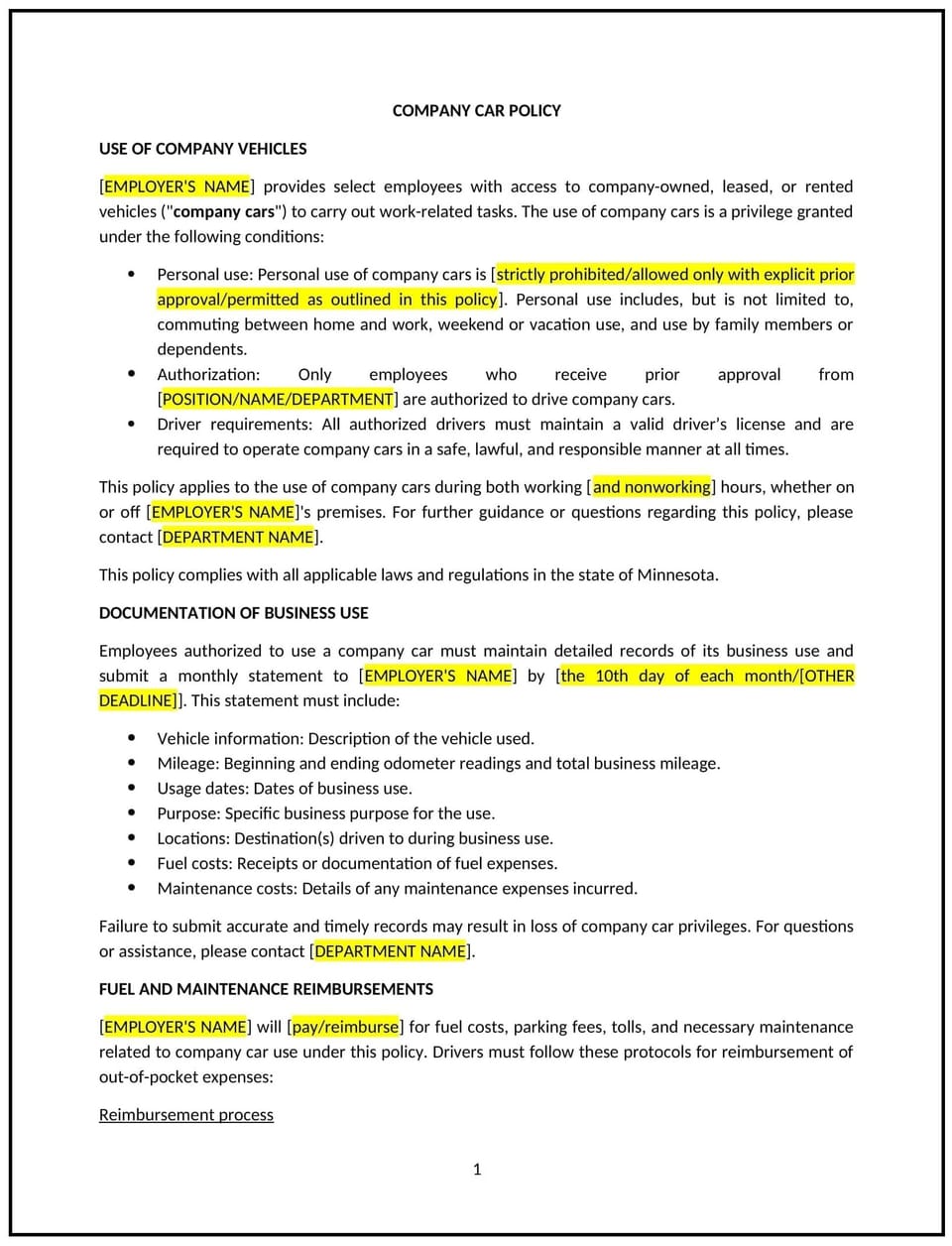Company car policy (Minnesota): Free template

Company car policy (Minnesota)
This company car policy is designed to help Minnesota businesses establish clear guidelines for the use of company-owned or leased vehicles. Whether businesses are providing cars for work-related travel, employee commuting, or other business purposes, this policy provides a framework to promote safety, accountability, and efficient use of resources. Tailored to Minnesota’s legal and operational environment, this policy emphasizes responsible vehicle use, maintenance, and compliance with state laws.
By implementing this policy, businesses in Minnesota can reduce risks, protect their assets, and ensure fair and consistent use of company vehicles.
How to use this company car policy (Minnesota)
- Define eligibility: Clearly outline which employees are eligible to use company cars, such as those with specific job roles or travel requirements.
- Establish usage guidelines: Provide rules for using company cars, including approved purposes (e.g., work-related travel), personal use limitations, and geographic restrictions.
- Address safety requirements: Require employees to follow traffic laws, maintain valid driver’s licenses, and adhere to safe driving practices.
- Outline maintenance responsibilities: Specify who is responsible for routine maintenance, repairs, and cleaning of company vehicles.
- Set insurance requirements: Ensure company cars are adequately insured and outline employee responsibilities in case of accidents or damage.
- Monitor fuel usage: Provide guidelines for fuel purchases, reimbursement, or the use of company fuel cards.
- Communicate consequences for misuse: Outline disciplinary actions for violations of the policy, such as unauthorized use or reckless driving.
- Review and update the policy: Regularly assess the policy’s effectiveness and make adjustments as needed to reflect changes in business needs or state laws.
- Communicate the policy: Share the policy with eligible employees during onboarding and through regular reminders, such as emails or training sessions.
Benefits of using this company car policy (Minnesota)
This policy offers several advantages for Minnesota businesses:
- Promotes accountability: Clear guidelines help ensure company cars are used responsibly and for approved purposes.
- Reduces risks: Establishing safety and maintenance requirements minimizes the risk of accidents, liability, and vehicle damage.
- Protects assets: A structured policy helps maintain the condition and value of company vehicles.
- Supports compliance: The policy helps businesses align with Minnesota state laws, such as insurance and traffic regulations.
- Enhances efficiency: Guidelines for fuel usage and maintenance ensure cost-effective management of company cars.
- Improves employee satisfaction: A fair and transparent policy fosters trust and clarity for employees who use company vehicles.
- Strengthens reputation: Demonstrating responsible vehicle management enhances the business’s reputation among employees and the community.
Tips for using this company car policy (Minnesota)
- Communicate the policy effectively: Share the policy with eligible employees during onboarding and through regular training sessions.
- Train employees: Educate employees on safe driving practices, maintenance responsibilities, and the policy’s guidelines.
- Monitor usage: Regularly review vehicle logs, fuel receipts, and maintenance records to ensure compliance with the policy.
- Be consistent: Apply the policy uniformly to all eligible employees to avoid perceptions of favoritism or bias.
- Encourage feedback: Regularly seek input from employees on how the policy can be improved to better meet their needs and the business’s goals.
- Review the policy periodically: Update the policy as needed to reflect changes in business needs, state laws, or industry standards.
Q: Why should Minnesota businesses adopt a company car policy?
A: Businesses should adopt this policy to promote responsible vehicle use, reduce risks, and protect company assets.
Q: Who is eligible to use company cars?
A: Eligibility should be clearly defined, typically including employees with specific job roles or travel requirements.
Q: What are the approved uses for company cars?
A: Approved uses should include work-related travel, commuting, and other business purposes, with limitations on personal use.
Q: How should businesses handle maintenance and repairs?
A: Businesses should specify who is responsible for routine maintenance, repairs, and cleaning of company vehicles.
Q: What insurance requirements should businesses consider?
A: Businesses should ensure company cars are adequately insured and outline employee responsibilities in case of accidents or damage.
Q: How can businesses monitor fuel usage?
A: Businesses should provide guidelines for fuel purchases, reimbursement, or the use of company fuel cards.
Q: How often should the policy be reviewed?
A: The policy should be reviewed annually or as needed to reflect changes in business needs, state laws, or industry standards.
This article contains general legal information and does not contain legal advice. Cobrief is not a law firm or a substitute for an attorney or law firm. The law is complex and changes often. For legal advice, please ask a lawyer.


